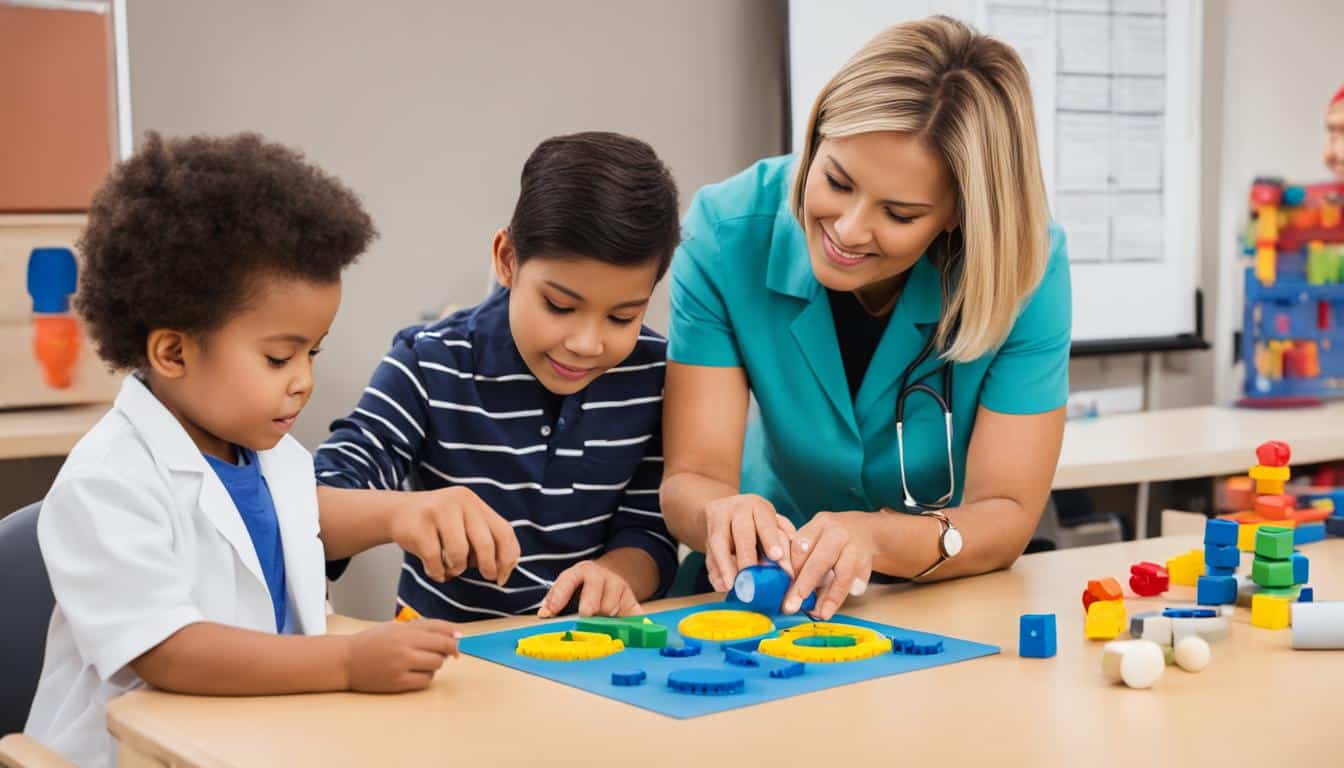
Understanding Developmental Screening and Assessments for Kids
As a professional in the healthcare industry, I understand the importance of developmental screening and assessments for kids. These tools help identify potential developmental delays, so children can receive early interventions and support to reach their full potential. Developmental screening and assessments are crucial during a child’s early years, as this is when their brains are developing rapidly, and early interventions can have a significant impact on their future success.
In this article, we will explore what developmental screening and assessments are, why they are essential, and the different types available. We will also cover the process involved in these assessments and how parents and caregivers can play a crucial role in supporting their child’s development.
Key Takeaways
- Developmental screening and assessments help identify potential developmental delays in children.
- Early interventions and support for children can have a significant impact on their future success.
- There are various types of developmental assessments that cover cognitive, social-emotional, language, motor, and adaptive skills.
- Parents and caregivers play a crucial role in supporting their child’s development during the assessment process.
- Understanding developmental screening and assessments is crucial for supporting children’s growth and early learning milestones.
What is Developmental Screening?
Developmental screening is the process of assessing a child’s developmental progress to identify potential developmental delays at an early stage. Its purpose is to ensure that children receive the required support to develop the necessary skills they need to thrive.
Healthcare professionals use screening tools to evaluate key areas of development, including cognitive, language, motor, and social-emotional skills. Pediatricians may use informal assessments, while psychologists and occupational therapists may use more in-depth assessments to identify developmental delays.
“Developmental screening is an essential process that helps parents and caregivers provide individualized support to children and promote healthy development.”
Developmental screening is a crucial step in early intervention for children with developmental delays. By identifying potential concerns early on, healthcare providers can create a tailored intervention and support plan for the child.
Benefits of Developmental Screening
Developmental screening provides several benefits, including:
- Early identification of developmental delays
- Promotion of timely intervention and treatment
- Improved outcomes for children with developmental needs
- Engagement of parents and caregivers in their child’s developmental progress
- Reduction of potential academic and social difficulties later in life
Overall, developmental screening is a significant step in supporting children’s growth and development, and it is crucial for healthcare professionals and caregivers to prioritize it.
Why Are Developmental Assessments Important?
Developmental assessments play a crucial role in identifying children’s strengths and areas where they may need extra support. By assessing a child’s development, we gain a comprehensive understanding of their abilities and can identify potential developmental delays early on.
Early intervention for developmental delays is essential for ensuring a child reaches their full potential. Without appropriate intervention, developmental delays can have long-term effects on a child’s cognitive, social-emotional, and physical development.
Developmental assessments provide a standardized framework for evaluating a child’s development and can help track progress over time. This data is invaluable for parents, caregivers, and healthcare professionals, as it enables them to provide the most appropriate support and intervention strategies.
Importantly, developmental assessments also provide parents and caregivers with a deeper understanding of their child’s development, helping them to tailor their parenting style to meet their child’s specific needs. This can have a significant impact on a child’s overall development and early learning outcomes.

In summary, developmental assessments are crucial for identifying potential developmental delays, tracking progress, and providing appropriate intervention and support. By gaining a comprehensive understanding of a child’s development, we can promote their overall growth, development, and learning outcomes.
Types of Developmental Assessments
Developing an understanding of the different types of developmental assessments available is crucial for identifying areas where support is needed and providing necessary interventions. The following assessments focus on different areas of a child’s development:
| Assessment Type | Description |
|---|---|
| Cognitive Assessments | These assessments focus on intellectual development, problem-solving skills, and critical thinking abilities. |
| Social-Emotional Assessments | These assessments measure a child’s emotional regulation, social skills, and ability to form relationships. |
| Language Assessments | These assessments evaluate a child’s communication and language skills, including comprehension, expression, and vocabulary. |
| Motor Assessments | These assessments assess a child’s gross and fine motor skills, coordination, and physical development. |
| Adaptive Assessments | These assessments measure a child’s ability to function independently in daily activities, such as self-care, eating, and getting dressed. |
By utilizing a combination of these assessments, healthcare professionals can gain a holistic view of a child’s development and identify potential areas for support. It is important to note that not all children require all types of assessments, and medical professionals will determine which assessments are necessary on a case-by-case basis.
Combining Developmental Assessments
The use of multiple assessments is an effective method for gaining a comprehensive understanding of a child’s developmental progress. For example, combining cognitive and language assessments can provide insight into a child’s overall intellectual development and ability to communicate effectively. Social-emotional and adaptive assessments may be combined to gain a better understanding of a child’s behavioral and functional development.

The Process of Developmental Screening and Assessments
The process of developmental screening and assessments involves several steps. The aim is to identify potential developmental delays early on and provide the necessary support and interventions for children to reach their full potential.
- Initial Screening: Developmental screening typically begins in infancy or early childhood. Healthcare professionals use standardized screening tools to check if a child is meeting age-appropriate developmental milestones.
- Follow-Up Assessments: If the initial screening indicates a potential delay, follow-up assessments are necessary to confirm a diagnosis and get a more detailed view of a child’s development. Parents and caregivers are often involved in the assessment process and provide valuable information about a child’s behavior and development.
- Collaboration and Referrals: Based on the results of the assessment, healthcare professionals collaborate with parents and caregivers to develop an intervention plan. This may include referrals to other healthcare professionals or early intervention services to provide support to the child.
The Role of Parents and Caregivers
Parents and caregivers play a crucial role in the developmental screening and assessment process. When parents and caregivers are actively involved, healthcare professionals can get a better understanding of a child’s behavior and development, which can lead to improved outcomes. They can also provide valuable input and insights into the child’s daily routines, behavior, and milestones. Through collaboration, parents and caregivers can learn how to support their child’s development and provide the necessary interventions to support their child’s growth.
Regular developmental screenings and assessments are essential for identifying potential delays early on and providing the necessary interventions to support children’s growth and development. By working together with healthcare professionals, parents and caregivers can ensure that their child receives the support they need to reach their full potential.
Conclusion
After delving into the topic of developmental screening and assessments for kids, I have come to understand the importance of these tools in supporting children’s growth and early learning milestones. As a caregiver or parent, being aware of developmental screening and assessments can assist in identifying potential delays in a child’s development, leading to timely interventions and support.
Through developmental assessments, we can gain a comprehensive understanding of a child’s development across multiple domains, including but not limited to cognitive, social-emotional, language, motor, and adaptive skills. This holistic view of a child’s development can help identify areas where additional support may be needed.
It is crucial that parents and caregivers are actively involved in the process of developmental screening and assessments, working collaboratively with healthcare professionals to ensure the best outcomes for children. From initial screenings to follow-up assessments, we must remain engaged and informed to ensure that we are supporting our children to reach their full potential.
In conclusion, understanding developmental screening and assessments is essential for providing the necessary interventions and support to help children thrive. By being informed and proactive in the screening and assessment process, we can help ensure that every child reaches their developmental milestones and achieves their full potential.
FAQ
What is developmental screening?
Developmental screening is a process used by healthcare professionals to identify potential developmental delays in children. It involves the use of specific tools or questionnaires to assess a child’s development in areas such as communication, motor skills, cognitive abilities, and social-emotional interactions.
Why are developmental assessments important?
Developmental assessments play a vital role in understanding a child’s overall development and identifying areas where support may be needed. These assessments provide a comprehensive evaluation of a child’s skills and help determine if there are any delays or concerns that require further evaluation or intervention.
What are the different types of developmental assessments?
There are various types of developmental assessments available, each focusing on different aspects of a child’s development. Some common types include cognitive assessments to evaluate thinking and problem-solving skills, social-emotional assessments to assess social interactions and emotional regulation, language assessments to measure communication skills, motor assessments to evaluate physical abilities, and adaptive assessments to assess self-help and daily living skills.
What is the process of developmental screening and assessments?
The process of developmental screening and assessments typically involves several steps. It begins with an initial screening using validated tools to identify potential delays or concerns. If any areas of concern are identified, further assessments may be conducted to gather more detailed information about the child’s development. Parents and caregivers play an important role in this process by providing information and participating in the assessments. The results of the screenings and assessments help guide interventions and support for the child.